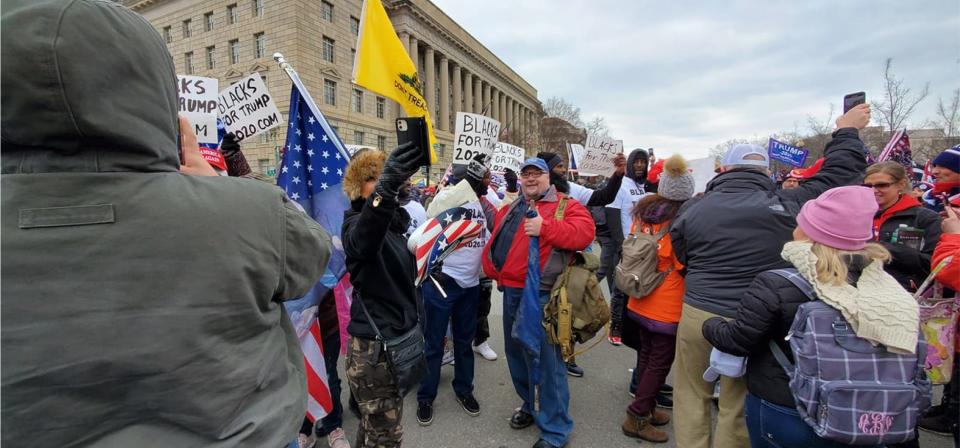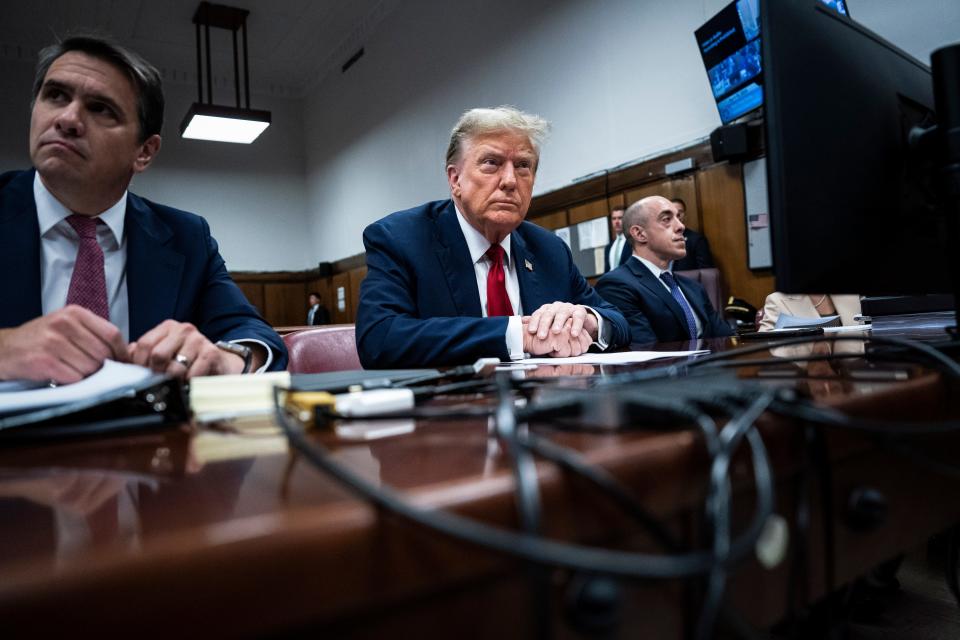Supreme Court weighs obstruction charge against hundreds of Jan. 6 defendants including Donald Trump
- Oops!Something went wrong.Please try again later.
WASHINGTON – The Supreme Court will hear arguments Tuesday about whether an obstruction law wielded against one-fourth of the defendants charged in the Capitol attack on Jan. 6, 2021, should be invalidated.
The outcome could help Donald Trump, who is facing charges related to trying to overturn the 2020 election. It could also have significant consequences for the Jan. 6 rioters who were charged with obstruction; the charge can add up to 20 years to a prison sentence.
A former police officer, Joseph Fischer, who was charged in the riot, contends Congress approved the law in 2002 after the Enron scandal to target document shredding, which he didn't do at the Capitol.
But government lawyers contend the law is a "catchall" that includes blocking official meetings such as Congress counting Electoral College votes.
The high court's decision could echo widely because more than one-fourth of Jan. 6 defendants faced the charge – including former President Trump.
Several prisoners have been released pending their appeals because the justices could overrule how the law has been applied so far.
But Justice Department special council Jack Smith has argued even if the law is invalidated for rioters, it could still be applied to Trump because of other actions he took leading up to Jan. 6.
The high court has no deadline to resolve the dispute, but a decision is expected by the end of June.
Here is what we know about the case:

Former cop challenges federal obstruction charge in Jan. 6 case
Fischer entered the Capitol Rotunda on Jan. 6 and confronted police but he contends he wasn't violent. He faces a handful of misdemeanors with up to one-year sentences and the disputed felony obstruction charge, which carries a maximum 20-year sentence.
Congress approved the law in 2002 as part of an overhaul of the financial system to prohibit destruction of documents after the scandal surrounding Enron, according to court records.
The disputed language prohibits anyone from “corruptly” destroying or concealing a government record, or who “otherwise obstructs, influences, or impedes any official proceeding, or attempts to do so.”
Fischer’s lawyers contend no defendant had been convicted of obstructing Congress before Jan. 6 outside of a legislative inquiry or investigation.
But government lawyers led by Solicitor General Elizabeth Prelogar argued the obstruction law is a "catchall” that should cover Fischer’s conduct “because he allegedly joined a violent riot with the purpose of disrupting a joint session of Congress convened to certify the election results."

1 in 4 Jan. 6 defendants face charge Supreme Court is reviewing
Fischer’s case could have a bigimpact on otherJan. 6 defendants. About 330 of the first 1,265 defendants in the attack were charged under the law, according to the Justice Department.
Another Jan. 6 defendant, Thomas Robertson, has challenged a different facet of the same law by arguing that he wasn't acting corruptly on Jan. 6 because he wasn't aiming for personal gain, like with stealing.
Robertson’s potential appeal to the Supreme Court is on hold while he waits for the justices to decide Fischer’s case.
Judges already releasing prisoners because law could be invalidated
The D.C. Circuit Court of Appeals has upheld the obstruction law so far. But with at least four of the nine justices agreeing to hear Fischer’s arguments for overturning it, judges have already begun ordering the early release prisoners rather than risk holding them longer than misdemeanor sentences.
One prisoner, Thomas Adams, who had entered the Senate chamber, was freed in January after serving about five months of a 14-month sentence.
Alexander Sheppard is set to be released May 2 after serving six months of a 19-month sentence.
And Kevin Seefried, who carried a Confederate flag in the Capitol and was sentenced to three years in prison, is scheduled to be released May 31 after one year behind bars.
Supreme Court decision could alter Trump's election interference case
Two of the four charges inTrump’s federal election interference case rely on portions of the same law that Fischer is challenging.
Trump’s trial is on hold while waiting for the Supreme Court to consider whether he is immune from all the federal charges, with arguments scheduled April 25.
Smith argued in a filing in Trump's immunity case that the obstruction charges "are valid." Trump is charged with organizing fraudulent slates of presidential electors in 2020 and causing them to send fake certificates to Congress.
“That alleged conduct falls well outside of any conception of presidential official acts,” Smith wrote.
This article originally appeared on USA TODAY: Supreme Court weighs charges in Jan. 6 cases. Will it help Trump?

